1. The Supreme Leader's Financial Juggernaut
The New York Times reported last week that Bloomberg News shelved a months-long investigation into the finances of top Chinese leaders, perhaps out of concern that the report would anger China, jeopardize Bloomberg News' access and potentially impact Bloomberg's business dealings in the country. Luckily, concerns about spoiling business deals don't apply when it comes to Iran. And this week Reuters published a detailed, three-part investigation into Setad, a little-known organization controlled by Iran's Supreme Leader, Ayatollah Ali Khamenei, which has morphed from a charitable group designed to help the poor into a one of the most powerful groups in Iran.
Setad controls around $95 billion in assets, Reuters reports. It has amassed a giant real estate portfolio, often by illegally seizing property from religious minorities and Iranians living abroad. The group now has ties to almost every sector of the economy.
"Today, Setad's vast operations provide an independent source of revenue and patronage for Supreme Leader Khamenei, even as the West squeezes the Iranian economy harder with sanctions in an attempt to end the nuclear-development program he controls," Reuters reports.

2. Our Brand Could Be Your Lifeline
It's been nearly a decade and a half since Moby's album "Play" drilled itself into our collective consciousness. It's groovy blues-tinged techno beats became omnipresent. The songs were in ads, movies, clothing stores -- there was no escape. Eventually all 18 tracks were licensed for commercial use. "We made a conscious effort to create a marketing plan that had nothing to do with radio," one of Moby's managers told Wired.
At the time, such crass commercialism could brand an artist as a sellout. But today, as Jessica Hopper writes in BuzzFeed, licensing music for commercial use no longer carries such a stigma. "There are few bands that are no longer gettable; many are eager to take whatever money is on the table," Hopper writes.
And, as record labels continue to struggle to adapt to the new digital age, commercial brands are providing one of the last sources of real money for artists, and can provide the exposure a band needs to break into the mainstream.
Plus, there are other advantages. "For some artists, taking a check from Bacardi, Pepsi, or Red Bull is an easier transaction than dealing with labels in that it's cut-and-dry -- everyone knows what they're getting," Hopper writes.

3. The Future Of Pop Music?
On the other side of the coin, there is Lorde, the breakout New Zealand singer-songwriter who just turned 17 this month, and whose debut hit "Royals" has been firmly ensconced at the top of the Billboard Hot 100 chart for weeks.
Lorde is being hailed as the future of pop music, and she has been profiled in outlets from Rolling Stone to the New Yorker. But Duncan Greive's article at Faster Louder is one of the best. Greive spent time with Ella Yelich-O'Connor and her family, managers and collaborators, and provides a more intimate and detailed portrait of her than I've read before.
In contrast to bands that ride a major ad campaign to fame and fortune, Lorde has become a success by almost actively shunning the commercial machine that pumps out other pop stars. She released her first EP, "The Love Club," for free online, and her fame spread initially by word of mouth.
"Her instincts told her not to release anything until it was perfect, to feed her imagery out slowly, to value artistic integrity over commercial considerations in her music videos," Greive writes. "Joel Kefali, who shot her first two clips ... points out how good Lorde is at balancing 'pop values versus indie values'. There's always a lot of pressure to have the pop side win out; thus far she's trusted her instincts and resisted."
Maybe not for much longer, though. She set herself apart from other pop stars by insisting that she write her own songs, unlike the Justin Biebers and Miley Cyruses of the world. But just this week she did a seemingly very un-Lorde-like thing, releasing a cover of Tears for Fears' "Everybody Wants To Rule The World" as part of the "Hunger Games: Catching Fire" soundtrack. Hardly a stand for original songwriting or anti-commercialism.
But perhaps that's no longer such a big deal at this point, now that she's gained a huge, rabid following. "It doesn't matter," Universal New Zealand managing director Adam Holt told Greive when asked what her next single would be. "People are buying into her."

4. City Of Dreams
The pursuit of fame and fortune can have tragic consequences. Over the past two weeks, the Miami New Times has published two feature stories that highlight this quite vividly. In one, Terrence McCoy writes about Jimmy Sabatino, a 36-year-old master con artist who scammed his way into opulent, champagne-drenched nights in luxury hotel suites, expensive restaurants and more -- only to land himself in prison.
"No one wants to believe his cons more than Jimmy Sabatino," McCoy writes. "He desperately -- obsessively -- wants to be a big shot. It's all he thinks about. All he talks about. All he cares about. The lights of fame, the sheen of success, the millions. He'd do anything for that life."
In the second article, Michael E. Miller writes the epic story of how John Snavely -- better known by his porn star name, "Champ" -- wound up allegedly murdering a successful businessman, Samuel Del Brocco. It's a classic story of sex, drugs, violence and the pursuit of fame.
"Champ had a compulsive personality, whether it was sex, drugs or money," a friend of Snavely's told Miller. "He wanted all the trappings of success, and he didn't feel good if he didn't have them."

5. The Original NSA Whistleblower
At Gawker, Adrian Chen coaxes Perry Fellwock, a semi-retired antiques dealer living in Long Island, N.Y., into talking about his former life as Winslow Peck, the first NSA whistleblower, who spilled his secrets to Ramparts magazine in 1972.
"At the time, only the broadest outlines of the NSA's activities had ever been reported in the press," Chen writes. "Its headquarters were unmarked; its description in official government documents restricted to an absurdly vague, 'Performs highly specialized technical and coordinating functions relating to the national security.' The post-Snowden spectacle of the NSA chief testifying before Congress, and then being caught in falsehoods by further leaks, was unimaginable. No director would have spoken publicly about the agency's mission at all, let alone anything it might or might not have done."
"And there, in 1972," Chen continues, "was a rogue analyst, some kid in his 20s, describing the NSA's business down to the colors of the badges worn at its headquarters. Winslow Peck claimed that the NSA had broken all of the Soviets' codes, that the government's official account of the Vietnam War was a lie, and that the agency was guilty of salacious corruption."
It's a fascinating read.
Have you read a good longform feature lately? Email me at sasha@huffingtonpost.com. You can also follow me on Twitter.
